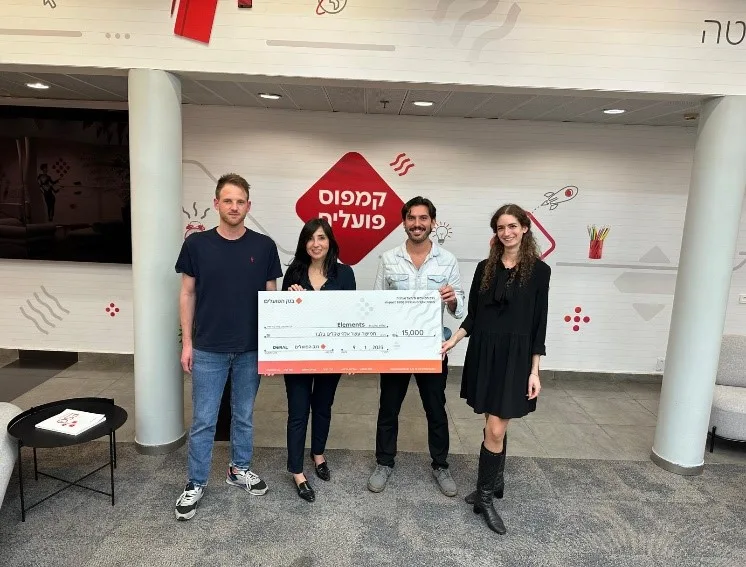More than 6,000 companies constitute the vibrant startup scene of Israel. One field that has been gaining special momentum recently in the Startup Nation is Climate-tech, with over 700 startups. According to PLANETech’s “Israel’s State of Climate-Tech 2022” report, over 300 climate-tech startups were founded in the past five years, and more than $5.5B has been invested in Israeli companies in the field since 2019. The need for solutions to tackle the climate change and its ramifications is clear and pressing yet developing innovation in the field of climate and energy is different and more complex than in some other sectors, for a combination of reasons.
First, while the awareness of the climate crisis has been increasing recently, the challenges in this field are still less known among entrepreneurs and technological investors. Second, interdisciplinary mastery is required to develop technologies in the field, which often involve beside software, development of hardware, complex regulation, and cross-sector cooperation. Third, considering this complexity, commercialization requires more time and greater financial investment from developments that are solely software-based. This makes climate-tech somewhat less attractive for investors and accordingly, more challenging for entrepreneurs, especially in the current economic atmosphere.
Another main reason is the lack of support and accelerators that can help early-stage entrepreneurs with crossing the chasm and fight climate change. This is why Poalim Impact unit at Bank Hapoalim, which is one of the leading banks in Israel, has decided to partner with Doral Group and the 8200 Alumni Association to support climate-tech startups in the beginning of their journey through the 8200 Impact acceleration program.
8200 Impact is the first acceleration program and community for Israeli impact-tech startups, that tackle significant social or environmental challenges through advanced technology, for the benefit of society and economy, locally and globally.
The accelerator was founded in 2013 to harness the human capital of the 8200 elite IDF signal intelligence and cybersecurity unit alumni for the greater good. Therefore, any Israeli impact entrepreneur in the stage of seed or pre-seed funding can apply to the program, regardless of their background. The program will conclude its 8th cycle in April 2023 with 12 promising ventures and has more than 84 graduate startups with 60 per cent of continuity rates.
Following a rigorous screening process, 10-12 startups are selected with the help of experts from Bank Hapoalim, Doral Group and additional program partners. The program operates three main tracks: Accessibility, Health, and Climate & Energy-tech. The selected startups take part in a 5-month acceleration program filled with workshops and meetings with successful entrepreneurs, top-tier professionals, and investors, alongside a tailor-made mentorship process with leading industry experts. As a non-profit organization, the program does not take equity nor claim ownership of our ventures’ IP.

The entrepreneurs receive grants from the Bank and Doral Group on the Climate & Energy Track Day
From left to Right: Guy Yavin, Investment Director of Doral Group, Sharon Alaluf, Head of ESG at Bank Hapoalim, Edo Perry, CEO and Founder at Elements, Leehe Friedman, 8200 Impact Managing Director
The Climate and Energy-tech Track
“Accelerating the transition to a low-carbon economy to deal with the climate crisis requires above all – technological innovation. Bank Hapoalim is the financial intuition that provides the largest funding in Israel for ventures that promote a green environment and was also the first in Israel to issue a green bond.
We also support the ecosystem and provide tailored banking services as well as credit facilitation for startups and tech companies focused on climate tech through Poalim Hi-Tech”, says Ms. Sharon Alaluf, Head of ESG at Bank Hapoalim. “We are proud to be the initiators and partners, together with Doral Group, of 8200 Impact’s Climate and Energy Track. We see this partnership as an opportunity to support the development of technology that will assist in dealing with one of the most significant challenges for the future of us all.”
The Climate and Energy Track contains 4-6 startups each cycle, which benefit from direct access to professional guidance from mentors and consultants from Bank Hapoalim, Doral Renewable Energy Resources Group and Doral-Tech Ventures, and the vast network of the 8200 graduates, many of whom are top tier entrepreneurs and investors. The entrepreneurs also take part in weekly workshops and exclusive seminars days and receive personal grants from the Bank and Doral Group.
Chen Shmilo, CEO of the 8200 Alumni Association, and Leehe Friedman, Managing Director of 8200 Impact, add: “The optimal way to promote technological entrepreneurship in this field is by forming an intersectional collaboration between the private market, the government and the civil society. We highly appreciate the strategic decision of Bank Hapoalim and Doral Group to collaborate with us. The startups in the track receive direct access to potential design partners, technological talents and climate investors through this partnership”.
This partnership already shows positive results. One of the track’s recent graduates is Alteco.ai, the ‘Shazam’ of energy Management. This Israeli startup aims to reduce industrial carbon footprint, through an accessible, cost-effective, and simple-to-operate energy management solution. The company has already proved savings of 15 per cent in energy consumption with the use of its technology in different settings.
After joining the 7th cycle of the 8200 Impact program, the company completed a pre-seed round and increased its sales in Israel and in Europe. Alteco.ai was also selected to join the 8200 Alumni Association’s startups annual delegation to New York City, where they met with potential clients and started planning the company’s scale up to the US market.
The Climate and Energy Track of the 8200 Impact 8th cycle consists of six promising startups which make up half of the current program’s cohort. This demonstrates the momentum as well as the demand for support in early-stage tech startups in the field. The participating startups address different areas of the climate field: Sphere has developed an innovative cooling method that is efficient by at least 40 per cent and significantly reduces carbon emissions. GreenDays is a digital platform making clean energy accessible. Elements uses climate benefits to empower employees and companies to drive corporate sustainability goals. Novella develops innovative technology to produce raw ingredients from plant cells, for the food and pharmaceutical industries. eBBack develops a unique excess inventory exchange market-place, and Rplace offers a constructed wetlands impact and carbon credit management (MRV) platform. The next cycle of the program is expected to start in October 2023.
For more information: www.poalimhitech.co.il




